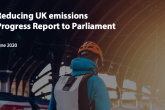Extend landfill tax to incinerator emissions, says white paper
The UK should price emissions from waste disposal, including landfill and incineration, to help reach the country’s target of net-zero carbon emissions by 2050, according to a new white paper by the Zero Carbon Campaign released on Monday (21 September).
Launched at an event organised by Green Alliance, the new white paper outlines how the UK Government can introduce carbon pricing across waste, electricity, heating, aviation, shipping, industry and agriculture to reduce carbon emissions.
 It calls upon the UK Government to increase landfill tax to reach £75 per tonne of CO2 equivalent (tCO2e) by 2035 and to extend it so that it includes emissions from waste incineration, as well as emissions from other energy-from-waste (EfW) plants.
It calls upon the UK Government to increase landfill tax to reach £75 per tonne of CO2 equivalent (tCO2e) by 2035 and to extend it so that it includes emissions from waste incineration, as well as emissions from other energy-from-waste (EfW) plants.
The white paper estimates that increasing this tax could bring in £27 billion by 2030 which the government could then put towards innovation and investment in green technologies, including de-risking early stage deployment of carbon capture and storage in energy from EfW facilities.
Landfill tax – currently £94.15 per tonne of waste sent to landfill – has been one of the most successful environmental taxes, both in diverting waste from landfill and in reducing waste emissions, with landfill emissions falling by 77 per cent since 1990.
Commenting on proposal, Libby Peake, Head of Resource Policy at Green Alliance, said: “For a long time after it was introduced, the landfill tax seemed to be very effective at diverting waste from landfill.
“But it’s now clear that its main achievement has been to divert waste straight into incineration. This is not compatible with a resource efficient, net zero world where waste is recycled, reused and – ideally – eliminated entirely. It’s clearly time to improve the landfill tax and revisit how the tax system can help us tackle waste.”
The proposal to extend it to waste incineration would be a controversial one, though calls have been increasing for an incineration tax in recent times.
Several MPs called for one in a Parliamentary debate at the start of the year, while UK Without Incineration Network (UKWIN) also recommended such a tax in 2017, while the former Chief Scientific Advisor to the Department for Environment, Food and Rural Affairs (Defra) Ian Boyd also called for its introduction in 2018.
The government has previously been against introducing an incineration tax, though in both Autumn Statement in 2018 and its Resources and Waste Strategy, the government stated that it would consider an incinerator tax in the future if long-term waste ambitions to maximise the amount of waste sent for recycling are not met.
Such proposals will likely encounter strong resistance from the waste management sector, with the Environmental Services Association (ESA) previously pushing back against criticism and calling for an end to the ‘demonisation’ of EfW, while think tank Policy Connect said that EfW is the solution to the UK’s long-term waste problem and should be the recipient of significant investment.
The white paper also recommends several pieces of legislation to reduce emissions from waste. These include banning recyclable materials and biodegradable waste from going into landfills, implementing extended producer responsibility (EPR) mechanisms and tightening restrictions on exporting waste overseas.
A biodegradable landfill ban has previously been called for by The Committee on Climate Change (CCC) after statistics showed that the UK was struggling to stay on track with efforts to curb greenhouse gas emissions. The UK Circular Economy Package (CEP) which transposes the majority of the EU CEP into UK law includes a ban on waste separately collected for recycling being sent to landfill or incineration, but the new white paper calls for all recyclable material, no matter how it was collected, from being disposed of.
The government’s much anticipated Environment Bill is due to include a ban on exporting plastic waste to developing countries. The UK’s plastic exports have had devastating impacts on Southeast Asian Communities where British waste has led to contaminated water supplies, failing crops and respiratory illnesses from the fumes caused from burning plastic.
The white paper was organised by the Zero Carbon Campaign’s commission, which includes John Sauven (Executive Director, Greenpeace UK), Lord Adair Turner (Former Chair, Committee on Climate Change) and Dr Rhian-Mari Thomas (CEO, Green Finance Institute).
It has been endorsed by Lord Nicholas Stern (Chair of the Grantham Research Institute on Climate Change and the Environment at the London School of Economics), Benet Northcote (Former Director of Corporate Responsibility at John Lewis Partnership), Clementine Cowton (Director of Policy, Octopus Energy Group) and Ian Parry (Principal Environment Fiscal Policy Expert, International Monetary Fund).
Commenting on the white paper, Lord Nicholas Stern, Chair of the Grantham Research Institute on Climate Change and the Environment, said: “A higher, simpler and more broadly applied carbon price is a crucial element in the fostering of a post-Covid economic recovery that is consistent with net-zero emissions by 2050. The ZeroC report contains detailed, thoughtful and pragmatic advice which the Government would be well advised to heed. The drive to zero carbon will be at the core of the sustainable and inclusive growth story of the 21st century.”
The white paper follows recent reports from the Committee on Climate Change, the Institute for Government and Climate Assembly UK. All three reports urge the UK Government to ramp up its climate ambition and set out a clear strategy for achieving net zero ahead of COP26, which will be hosted in Glasgow next November.
You can read the Zero Carbon Commission’s white paper in full on the commission’s website. You can also view a recording of the launch event on the Zero Carbon Commission website.









